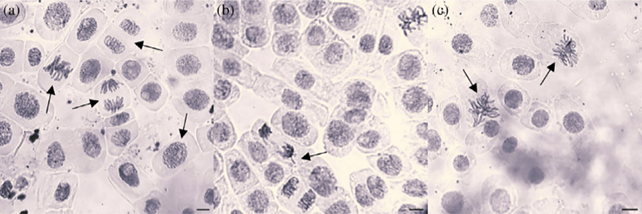Our love for coffee means millions of tons of spent coffee grounds going to waste every single year. Scientists have been working on ways to make use of them, and we now have another to add to the list: old coffee grounds have been shown to absorb bentazone, a herbicide used in agriculture.
If the technology can be developed, it would solve two environmental problems in one: coffee ground waste, and damage caused by farming herbicides to wildlife and the surrounding natural world.
A team from the Federal Technological University of Paraná (UTFPR) in Brazil found that when zinc chloride was used to activate the carbon in spent coffee grounds, this carbon showed a 70 percent efficiency in removing bentazone – the most commonly used herbicide in agriculture.

The scientists ran tests using bentazone dissolved in liquid, both before and after the treatment with the activated carbon from the used coffee grounds, looking at how it affected onion root tissues called meristems.
These tissues are points from which plants grow, so a plant's development is disrupted when they're damaged.
"Before adsorption, the effluent caused significant cytogenotoxicity to onion root meristems," write the researchers in their published paper. "After adsorption, the generated effluent no longer caused toxicity to the test system, and the results obtained were similar to the control with distilled water."
The Environmental Protection Agency (EPA) in the US has already flagged up potentially damaging levels of bentazone in groundwater and drinking water. It's also known to impact human health through inhalation, ingestion, or absorption through the skin.
As for old coffee grounds, they're bad for the environment whether they're dumped into water or sent to landfill sites. However, some of the chemical reactions they trigger have been shown to be useful in decontamination processes.
These are only preliminary results, but they're promising – they show that carbon from used coffee grounds is effective in treating water polluted by bentazone. The next steps will involve refining the processes here and scaling them up.
"This makes this study of great relevance in the industrial and environmental context because there are health and environmental problems with the uncontrolled use of these materials," write the researchers.
Whether it's enhancing the nutritional value of foods or even protecting against dementia, scientists are finding more and more ways to repurpose old coffee grounds – which makes us feel slightly better about our coffee guzzling habits.
As the team here acknowledges, it's not fully clear how the absorption process works, but the findings of the study should help future research in this area too. There are a number of possibilities for removing pesticide pollutants from the environment, but there's also still a lot of work to be done.
"Currently, the contamination of groundwater and surface water is one of the most pressing environmental problems – the biggest challenge of this century is to prevent water pollution," write the researchers.
The research has been posted in the Journal of Chemical Technology and Biotechnology.
